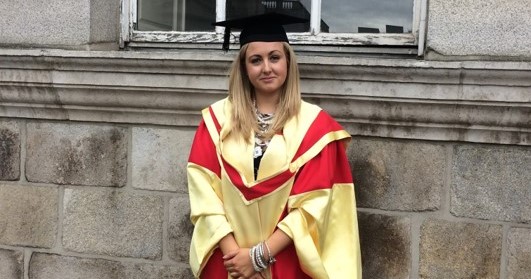Young investigator research group on electrocatalysis at HZB

Dr. Michelle Browne (here at her graduation ceremony in Dublin) starts now a Young Investigator Group at HZB. © privat
Dr. Michelle Browne establishes her own young investigator group at the HZB . Starting in August, the group is co-funded by the Helmholtz Association for the next five years. The electrochemist from Ireland concentrates on electrolytically active novel material systems and wants to develop next-generation electrocatalysts, for example hydrogen production. At HZB she will find the perfect environment to conduct her research.
Michelle Browne received her PhD in 2016 from the University of Dublin, Trinity College Dublin (TCD), Ireland. She held research fellow positions at universities in Belfast, Prague, and Dublin. She has received prestigious fellowships and awards, for example the Marie Skłodowska-Curie Individual Fellowship, L’Oreal UNESCO Rising Talent UK & Ireland Fellowship and the Clara Immerwahr Award.
Her research focuses on the synthesis of novel catalytically active materials such as transition metal oxides and MXenes. She aims to characterise and optimise these material systems in order to develop next-generation electrolyzer materials that can also be upscaled for industrial use, in order to produce green hydrogen.
Electrocatalysis: Synthesis to Devices
Michelle Browne's research project fits perfectly with the research projects already underway at the Institute for Solar Fuels and within CatLab. "At HZB, I have a wide variety of investigation methods at my disposal, from scanning electron microscopy to the various instruments at BESSY II, which also allow operando analyses," she says.
Michelle Browne's affiliation with the Technische Universität Berlin in the Institute of Chemistry is planned. Starting in the fall, Browne will recruit postdocs and PhD students to join her team.
arö
https://www.helmholtz-berlin.de/pubbin/news_seite?nid=23928;sprache=en
- Copy link
-
Battery research with the HZB X-ray microscope
New cathode materials are being developed to further increase the capacity of lithium batteries. Multilayer lithium-rich transition metal oxides (LRTMOs) offer particularly high energy density. However, their capacity decreases with each charging cycle due to structural and chemical changes. Using X-ray methods at BESSY II, teams from several Chinese research institutions have now investigated these changes for the first time with highest precision: at the unique X-ray microscope, they were able to observe morphological and structural developments on the nanometre scale and also clarify chemical changes.
-
BESSY II: New procedure for better thermoplastics
Bio-based thermoplastics are produced from renewable organic materials and can be recycled after use. Their resilience can be improved by blending bio-based thermoplastics with other thermoplastics. However, the interface between the materials in these blends sometimes requires enhancement to achieve optimal properties. A team from the Eindhoven University of Technology in the Netherlands has now investigated at BESSY II how a new process enables thermoplastic blends with a high interfacial strength to be made from two base materials: Images taken at the new nano station of the IRIS beamline showed that nanocrystalline layers form during the process, which increase material performance.
-
Martin Keller elected new president of the Helmholtz Association
The Helmholtz Association has appointed internationally respected US-based scientist Martin Keller as its new president. Her has lived in the United States for nearly three decades, during which he has held various scientific leadership roles at prominent institutions. Since 2015, Keller has directed the National Renewable Energy Laboratory (NREL) in Golden, Colorado. His term begins on 1.11. 2025.
